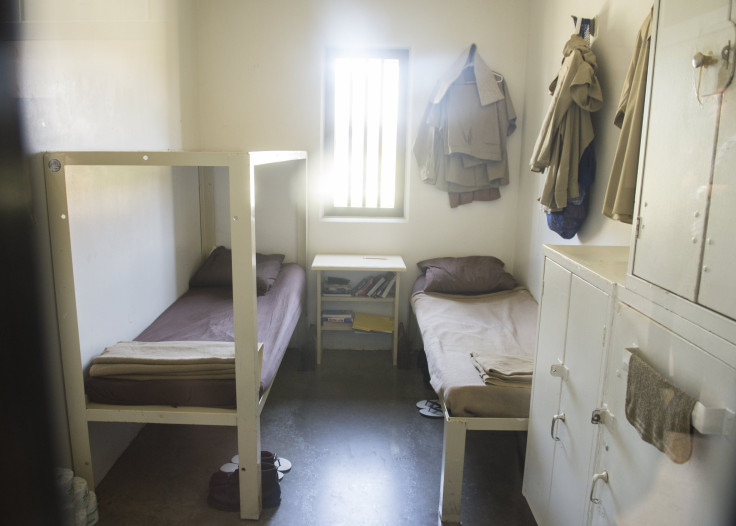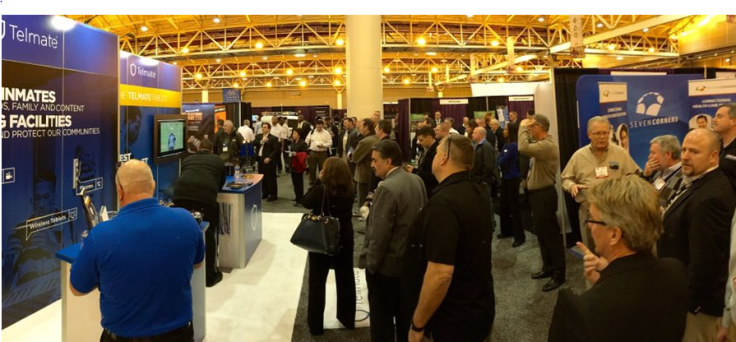Louisiana, ‘Prison Capital’ Of The World, Hosts Biggest US Prison Convention

NEW ORLEANS — The salesman stood outside the prison bus, inviting people inside for a brief tour. Those who obliged marveled at the steel “containment” cages, the bullet-resistant windows and the high-tech onboard surveillance systems.
The price tag for such a vehicle? About $580,000.
This bus, along with hundreds of other products and services, are on display this week at the American Correctional Association’s annual winter conference in New Orleans. According to the event’s organizers, it has become “the largest gathering of corrections personnel in the United States.”
While the conference offers several dozen educational workshops and panels about reforming the criminal justice system, the trade show on the convention center floors offers a peek into the sprawling private industry around incarceration. In many ways, it's just like any other trade show: Men and women stand by their companies' booths, wearing polo shirts adorned with their logos, handing out free pens, tote bags and brochures.
Unlike other conventions, however, this convention is closed to the public, and the customers on the trade show floor are mostly prison wardens, jail officials and directors from state corrections agencies. The exhibitors are there to make their pitch for a slice of the $80 billion incarceration industry in the U.S.
The companies aren't the only ones looking to earn money. In many states, sheriffs and wardens manage vastly overcrowded facilities, scraping by on meager budgets, and they look to private companies to help pay the bills. They do this, in many cases, by taking commissions on revenue from goods sold to inmates — everything from phone calls and commissary goods to even e-cigarettes.
Crossbar, maker of "prison-safe" e-cigarettes, advertised at the ACA. On its website, the company notes "CrossBar products will help generate revenue and increase profit margins necessary to help support your correctional facility in its efforts to continue the operation of various inmate programs."
At the opening reception on Sunday evening, across from the booth of GEO Group, the largest private prison operator in the world, waiters served up Mardi Gras cupcakes, Tasso ham macaroni and cheese, Louisiana pralines and pecan-encrusted chicken tenders.

More than 240 exhibitors from around the country came this year showcase their wares, spending up to $8,600 for a 20-by-20-foot booth for the three-day event. Besides the prison bus, which is manufactured by the Illinois-based Motor Coach Industries, the products on display include commissary food, restraint chairs, workout equipment, a high-tech “wand” that can locate inmate contraband, handguns, security fences, prison lighting and, naturally, locks and handcuffs. There was even one company, DeDrone, that sells drone detection security.
ACA Winterconference 2016 in New Orleans! Getting ready to rock da house! GO @Dedrone
https://t.co/ObwjSCTAq3 pic.twitter.com/CgIrnRffzl
— Joerg Lamprecht (@JoergLamprecht) January 23, 2016The ACA, a 501(c)(3) nonprofit based in Alexandria, Virginia, is the oldest and largest correctional association in the United States. It was founded in 1870 as the National Prison Association, and represents thousands of active professional members. They are perhaps best-known for their accreditation process, in which the ACA reviews the quality and standards of prisons and jails around the country, but the organization funds itself principally through its conventions. In 2014, the organization earned $9 million in revenue, and $997,000 in profit, according to financial filings.
In addition to booth space, the ACA sells a variety of sponsorship options. For instance, GEO Group, the private prison builder, paid $6,000 to put its logo on attendee badges. Telmate, a prison phone provider, paid $6,000 for a charging station. “This sponsorship will give your company continued exposure throughout the conference, as attendees and exhibitors charge their electronic devices,” the organizers note.
To view all the technological marvels on display, you really have to be there; a photography ban covers the whole convention center and it's strictly enforced.
Not everyone is too thrilled with the idea of a private prison trade show. “The whole idea of a system that exists for the purpose of keeping people locked up for profit creates all the wrong incentives,” said Marjorie R. Esma, the executive director of the local American Civil Liberties Union in New Orleans.
Such incentives, of course, can lead to more people in jail for petty crime. Look no further than Louisiana, which has been dubbed the “prison capital of the world” because of its high incarceration rates.
Out of 100,000 adults in the state, 1,420 are in jail or prison, according to the Bureau of Justice Statistics — the highest rate in the country. “The picture [of Louisiana] that emerges is one of convicts as chattel and a legal system essentially based on human commodification,” noted an editorial in the New York Times.

Wrong incentives also tend to lead to controversy for corrections officials, too. Just down the street from the convention center, the New Orleans sheriff, Marlin Gusman, came under intense scrutiny last year for “flouting city and state laws when he approved an incompetently negotiated $80 million contract for inmate health care at Orleans Parish Prison,” according to the Times-Picayune.
And up at Angola, the Louisiana State Penitentiary, the legendary prison warden Burl Cain retired suddenly in 2015 after it came to light that his side business dealings were potentially in breach of state law.
To be sure, the ACA event is more than just exhibitor booths. In addition to the trade show, which takes place on the ground floor of the convention center, attendees are invited to attend a series of educational workshops on the second floor. Many of these sessions are led by former wardens and academics, and the focus is on reforming the criminal justice system.
Interestingly, some of the panelists focused their discussions on the huge expense of the incarceration industry, the very thing that makes this convention so big. In a session titled “Transforming the Prison Culture,” Bob Hood, retired warden of the federal supermax prison in Golden, Colorado, said the United States spends about $7 billion to house some 200,000 inmates in the federal prison system, representing about 25 percent of the Department of Justice’s budget.
While the discussions upstairs were cerebral, the ones happening on the trade show floor were businesslike. In a pamphlet distributed to exhibitors, the ACA offers tips on how companies can “Max your ROI.”
The organization suggested offering a “giveaway or a raffle at your booth to attract people.” It added, "We wish you a profitable 2016 and we want you to have a great show.”
© Copyright IBTimes 2025. All rights reserved.





















